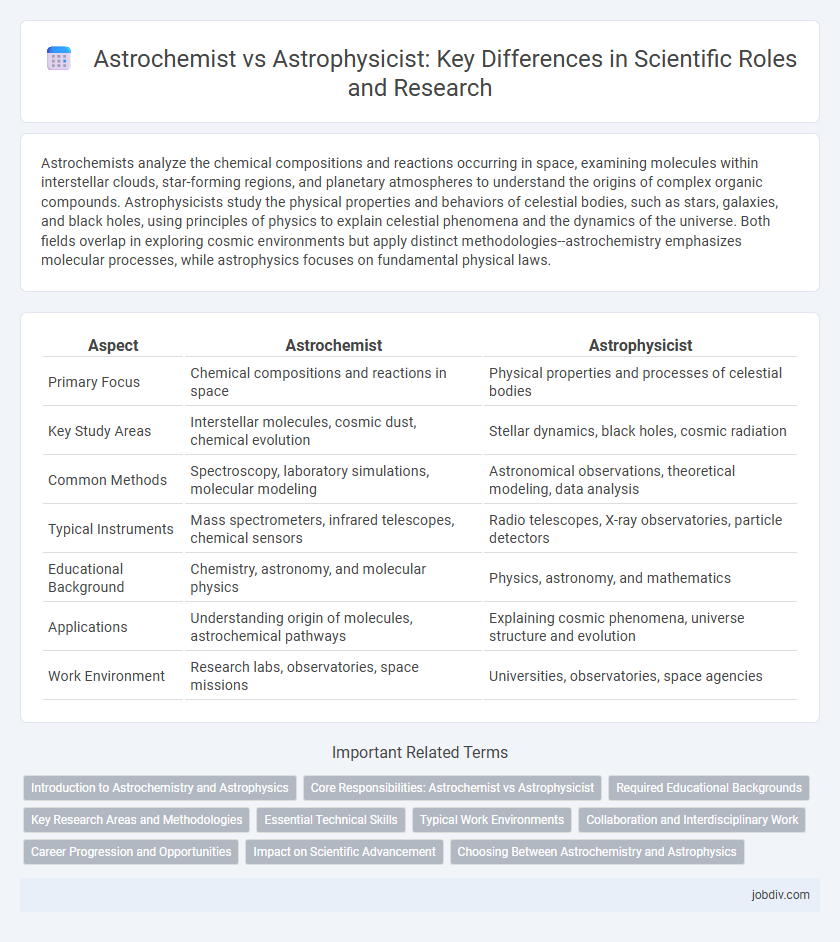Astrochemists analyze the chemical compositions and reactions occurring in space, examining molecules within interstellar clouds, star-forming regions, and planetary atmospheres to understand the origins of complex organic compounds. Astrophysicists study the physical properties and behaviors of celestial bodies, such as stars, galaxies, and black holes, using principles of physics to explain celestial phenomena and the dynamics of the universe. Both fields overlap in exploring cosmic environments but apply distinct methodologies--astrochemistry emphasizes molecular processes, while astrophysics focuses on fundamental physical laws.
Table of Comparison
| Aspect | Astrochemist | Astrophysicist |
|---|---|---|
| Primary Focus | Chemical compositions and reactions in space | Physical properties and processes of celestial bodies |
| Key Study Areas | Interstellar molecules, cosmic dust, chemical evolution | Stellar dynamics, black holes, cosmic radiation |
| Common Methods | Spectroscopy, laboratory simulations, molecular modeling | Astronomical observations, theoretical modeling, data analysis |
| Typical Instruments | Mass spectrometers, infrared telescopes, chemical sensors | Radio telescopes, X-ray observatories, particle detectors |
| Educational Background | Chemistry, astronomy, and molecular physics | Physics, astronomy, and mathematics |
| Applications | Understanding origin of molecules, astrochemical pathways | Explaining cosmic phenomena, universe structure and evolution |
| Work Environment | Research labs, observatories, space missions | Universities, observatories, space agencies |
Introduction to Astrochemistry and Astrophysics
Astrochemists analyze molecular clouds and interstellar medium compositions to understand chemical reactions in space, focusing on molecules such as hydrogen, carbon compounds, and complex organic species. Astrophysicists study the physical properties and behavior of celestial bodies, including star formation, galaxy dynamics, and cosmic radiation, using principles of physics and mathematics. The interdisciplinary field of astrochemistry bridges chemistry and astrophysics by examining the chemical processes that influence astrophysical phenomena.
Core Responsibilities: Astrochemist vs Astrophysicist
Astrochemists specialize in studying the chemical composition and reactions occurring in space, analyzing molecular clouds, interstellar dust, and star-forming regions to understand the origin of complex organic molecules. Astrophysicists focus on understanding the physical processes governing celestial bodies and cosmic phenomena, including the behavior of stars, galaxies, black holes, and the overall dynamics of the universe. While astrochemists emphasize chemical interactions at molecular and atomic levels in cosmic environments, astrophysicists apply principles of physics to explain the formation, evolution, and structure of astronomical objects and systems.
Required Educational Backgrounds
Astrochemists typically require advanced degrees in chemistry or astrochemistry, often holding a PhD focused on the chemical processes occurring in space, including molecular spectroscopy and reaction dynamics. Astrophysicists usually pursue degrees in physics or astronomy, with a strong foundation in mathematics, quantum mechanics, and cosmology to analyze celestial phenomena. Both fields demand rigorous research training, but astrochemists emphasize chemical analysis of interstellar molecules while astrophysicists concentrate on physical properties and mechanisms governing the universe.
Key Research Areas and Methodologies
Astrochemists investigate the chemical composition, reactions, and molecular processes occurring in space, utilizing spectroscopy and laboratory simulations to analyze interstellar molecules and cosmic dust. Astrophysicists focus on understanding the physical properties, dynamics, and evolution of celestial bodies and cosmic phenomena through observational astronomy, theoretical modeling, and computational simulations. Both disciplines employ advanced telescopes and data analysis techniques but differ in their emphasis on chemical processes versus physical forces shaping the universe.
Essential Technical Skills
Astrochemists specialize in the analysis of molecular compositions and chemical reactions in space, requiring proficiency in spectroscopy, chromatography, and advanced chemical modeling software. Astrophysicists focus on the study of celestial phenomena, demanding expertise in computational physics, data analysis, and telescope instrumentation. Both fields necessitate strong skills in programming languages like Python and proficiency in handling large datasets from observatories and space missions.
Typical Work Environments
Astrochemists typically conduct research in laboratory settings, utilizing advanced spectroscopic instruments to analyze chemical compositions of cosmic materials. Astrophysicists often work in observatories or with large-scale telescopes, focusing on the physical properties and behaviors of celestial bodies. Both professionals may collaborate in academic institutions or space agencies, where interdisciplinary studies of the universe are performed.
Collaboration and Interdisciplinary Work
Astrochemists and astrophysicists collaborate extensively to unravel cosmic phenomena, combining expertise in molecular processes and physical laws governing celestial bodies. This interdisciplinary work enables a comprehensive understanding of star formation, planetary atmospheres, and interstellar medium composition. Their joint research integrates spectroscopic data with theoretical models, advancing knowledge of chemical evolution in the universe.
Career Progression and Opportunities
Astrochemists specialize in the chemical compositions and reactions occurring in space, progressing through research roles in academia, government labs, or space agencies with opportunities to lead projects on molecular spectroscopy and astrochemical modeling. Astrophysicists focus on the physical properties and processes of celestial bodies, advancing from observational data analysis to theoretical modeling and often securing positions in universities, observatories, or aerospace companies. Both careers benefit from interdisciplinary collaboration, but astrochemists often engage more with chemistry and molecular physics, while astrophysicists emphasize physics and computational simulations, influencing their distinct career trajectories and research funding sources.
Impact on Scientific Advancement
Astrochemists analyze the molecular makeup of celestial bodies, enabling breakthroughs in understanding the chemical processes that govern star and planet formation. Astrophysicists study the physical properties and dynamic phenomena of astronomical objects, driving innovations in theories related to gravity, dark matter, and cosmic evolution. Their combined efforts accelerate scientific advancement by linking chemical compositions with physical mechanisms in the universe.
Choosing Between Astrochemistry and Astrophysics
Choosing between astrochemistry and astrophysics depends on whether your interest lies primarily in molecular processes in space or the physical properties and dynamics of celestial bodies. Astrochemists analyze molecular formation, chemical reactions, and complex organic compounds found in interstellar clouds, contributing to understanding star and planet formation. Astrophysicists focus on gravity, radiation, and the evolution of stars, galaxies, and the universe, employing physics principles and computational modeling to explore cosmic phenomena.
Astrochemist vs Astrophysicist Infographic

 jobdiv.com
jobdiv.com